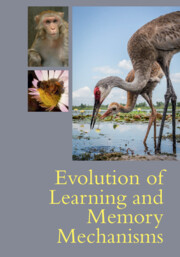Book contents
- Evolution of Learning and Memory Mechanisms
- Evolution of Learning and Memory Mechanisms
- Copyright page
- Contents
- Figures
- Tables
- Contributors
- Preface
- Introduction
- Part I Evolution of Learning Processes
- Part II Evolution of Memory Processes
- 16 The Evolution of Memory as an Immediate Perceptual Identification Mechanism
- 17 Episodic Memory in Animals
- 18 Evolutionary Origins of Complex Cognition
- 19 Evolution of Memory Systems in Animals
- 20 What Laboratory and Field Approaches Bring to Bear for Understanding the Evolution of Ursid Cognition
- 21 Distinguishing Mechanisms of Behavioral Inhibition and Self-control
- 22 Metacognitive Monitoring and Control in Monkeys
- 23 Adaptive Memory
- 24 Remembering Cheaters
- 25 Development of Memory Circuits under Epigenetic Regulation
- 26 Constraints on Learning and Memory
- Index
- References
22 - Metacognitive Monitoring and Control in Monkeys
from Part II - Evolution of Memory Processes
Published online by Cambridge University Press: 26 May 2022
- Evolution of Learning and Memory Mechanisms
- Evolution of Learning and Memory Mechanisms
- Copyright page
- Contents
- Figures
- Tables
- Contributors
- Preface
- Introduction
- Part I Evolution of Learning Processes
- Part II Evolution of Memory Processes
- 16 The Evolution of Memory as an Immediate Perceptual Identification Mechanism
- 17 Episodic Memory in Animals
- 18 Evolutionary Origins of Complex Cognition
- 19 Evolution of Memory Systems in Animals
- 20 What Laboratory and Field Approaches Bring to Bear for Understanding the Evolution of Ursid Cognition
- 21 Distinguishing Mechanisms of Behavioral Inhibition and Self-control
- 22 Metacognitive Monitoring and Control in Monkeys
- 23 Adaptive Memory
- 24 Remembering Cheaters
- 25 Development of Memory Circuits under Epigenetic Regulation
- 26 Constraints on Learning and Memory
- Index
- References
Summary
Metacognition, or thinking about thinking, can adaptively modulate cognitive processing. For example, a student preparing for an exam may introspectively evaluate what she knows well already so that she can allocate more time to studying material she does not know as well. Such metacognition involves feedback between metacognitive monitoring, which assesses the current state of cognition, and metacognitive control that effects changes in cognitive processing. Some interesting and complex forms of cognition likely involve metacognition. Metacognition is also linked to explicit memory, executive control, theory of mind, consciousness, and other phenomena central to cognitive science. Like learning, memory, and cognition, metacognition is likely present in at least rudimentary forms in some animals other than humans. Information about the extent to which metacognition occurs in animals other than humans informs our understanding about the evolution of cognition. Metacognitive monitoring likely evolved because it supports effective metacognitive control.
Keywords
- Type
- Chapter
- Information
- Evolution of Learning and Memory Mechanisms , pp. 392 - 405Publisher: Cambridge University PressPrint publication year: 2022

